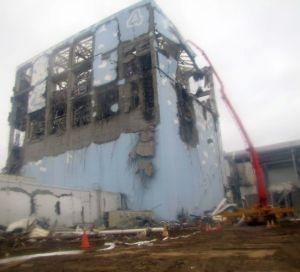Nuclear powerFukushima reaches cold shutdown conditions, critics scoff
Last week Japanese officials declared that the beleaguered Fukushima Daiichi power plant had become stable enough for engineers to complete a “cold shutdown”; officials also stated that the facility had ceased to leak substantial amounts of radiation, a claim received skeptically by critics

Fukushima Daiichi has finally reached cold shutdown condition // Source: nature.com
Last week Japanese officials declared that the beleaguered Fukushima Daiichi power plant had become stable enough for engineers to complete a “cold shutdown.”
Officials also stated that the facility had ceased to leak substantial amounts of radiation, a claim received skeptically by critics.
Greenpeace issued a statement blasting the Japanese government’s latest announcement.
“By triumphantly declaring a cold shutdown, the Japanese authorities are clearly anxious to give the impression that the crisis has come to an end, which is clearly not the case,” the group said. “Instead of creating a PR smokescreen to deflect attention away from the ongoing failure to help people living with the consequences of the disaster, the government’s priority should be to ensure public safety and begin the shutdown of all nuclear reactors in Japan.”
Earlier this month a Japanese baby food manufacturer recalled400,000 cans of powdered milk formula for infants after traces radioactive cesium from the Fukushima Daiichi plant had been found.
The baby formula recall was only the latest in a long series of contamination scares that have touched vegetables, tea, seafood, rice, and beef. The incident marked the first time radioactive isotopes were found in baby formula, causing particular concern among parents as children are more susceptible to dangerous side effects from radiation exposure.
Fueling concerns, earlier this month plant operators announced that forty-five tons of radioactive water had leaked from the facility into the Pacific Ocean, contradicting earlier claims made by plant officials.
Following the leak radioactive cesium was found in the water at levels 322 times higher than government safety limits.
The Fukushima Daiichi will likely continue to pose a potential danger to citizens for years to come.
Tokyo Electric Power Co, the plant’s operator, said engineers would not be able to remove spent nuclear fuel rods from the three hardest hit reactors for ten years. Meanwhile engineers would not be able to remove fuel from storage pools for another two years.
In addition, officials conceded that the twelve-mile evacuation zone around the plant would have to remain in place for several years, keeping roughly 80,000 of residents out of their homes.
In their latest announcement, Tokyo Electric was careful to note that the Fukushima Daiichi plant had only reached cold shut down conditions and that it was not entirely certain as measuring the temperature of melted fuel was imprecise compared to a normal facility.
